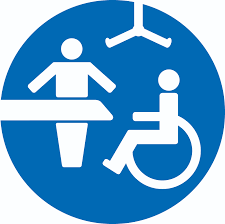Why loos are important
Talking about loos used to make me squirm with embarrassment. But since being diagnosed with a chronic pain condition 15 years ago, I’ve realised just how important they are. Did you know, you’ll spend more of your adult life on the toilet than you do at school, or socialising, or laughing? We all need access to safe, clean facilities, which is why the Changing Places campaign to install toilets for disabled people who experience the most barriers to access is so vital…
The pandemic forced us to talk about toilets. At the start, we stockpiled Andrex; later on, a socially-distanced drink in the park became a quest to find places to pee. The closure of many public loos during lockdowns meant that the next best option was a secluded bush – or just staying home watching Tiger King (again). This limit to people’s freedom impacted not only on personal wellbeing, but created a public health risk.
As a nation, we’ve collectively experienced the frustration and indignity of a lack of loos. So we should collectively exercise empathy – and action – for those who experience this as a daily reality, even after the lockdowns. What’s known as the ‘urinary leash’ impacts marginalised communities the most. The lives of women, pregnant people, disabled people, the elderly, trans people and others can be majorly restricted based on the availability of public facilities. Like many, my disability means I plan my day and my movements around access to loos. Like many, I have intentionally dehydrated myself, spent hours in pain, or been trapped at home.

Today, public toilets are under threat, for instance half have been closed in London over the past decade. But even the available toilets are not accessible for everyone. A quarter of a million people in the UK need Changing Places toilets. Changing Places toilets provide the space and equipment, like a bench and hoist, needed by disabled people who experience the most barriers to access. Without them, the only option is to be changed on the floor – or not leave the house at all. This is, as the Changing Places Consortium says, ‘dangerous, unhygienic and undignified.’
The number of Changing Places toilets is rising, but there are still nowhere near enough. Lack of a suitable toilet might make the difference between a child being able to go and see a show or not, and yet theatres are still being built without these facilities. The Changing Places Consortium is campaigning for Changing Places toilets to be installed in all public venues so that spaces we all have a right to – like the theatre – are accessible for everyone.
Why are loos important? Because offering free, clean toilets is one of the easiest ways to improve individual and public health and make the community accessible to everyone. Loos offer us freedom, and their availability, upkeep and closure is a political statement about who is welcome, and who belongs.
You can find ways to support the Changing Places campaign here.
